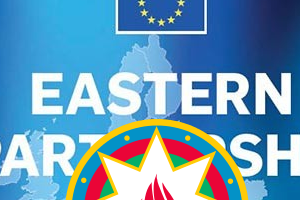Azerbaijan and the EU
By Natalia Konarzewska (06/24/2015 issue of the CACI Analyst)
Azerbaijan’s president Ilham Aliyev made a last-minute decision not to attend the European Union’s May 21–22 Eastern Partnership (EaP) summit in Riga, citing the need to focus on the upcoming European Olympic Games, which were about to start in Baku. However, high-ranking officials quoted in the media asserted that president Aliyev did not attend the summit due to Western criticism towards Azerbaijan. Baku also expressed dissatisfaction with the summit’s results as Azerbaijan hoped to receive more vocal Western support for the resolution of the Nagorno-Karabakh conflict. Instead, attention was focused on human rights violations in Azerbaijan. Azerbaijan’s relationship with the EU is becoming increasingly strained and displays growing disappointment from both sides.

CACI Analyst, June 24, 2015
Contents
Analytical Articles
EXISTING PARADIGMS FOR RESISTANCE IN THE NORTH CAUCASUS CHALLENGED BY KADYROV, ISIS, by Kevin Daniel Leahy
FOOTBALL NATIONALISM AMONG IRAN’S AZERIS, by Emil Souleimanov
KAZAKHSTAN COMPLETES WTO ACCESSION NEGOTIATIONS, by Nurzhan Zhambekov
AZERBAIJAN AND THE EU, by Natalia Konarzewska
Field Reports
RUSSIA ENHANCES ITS SOFT POWER IN GEORGIA THROUGH LOCAL NGOs, by Eka Janashia
BISHKEK AND TASHKENT FACE UNEASY RELATIONS, by Arslan Sabyrbekov
TAJIKISTAN’S ISLAMIC RESISTANCE PARTY STRUGGLES TO SURVIVE, by Oleg Salimov
ARMENIA AND IRAN HOLD POLITICAL CONSULTATIONS, by Erik Davtyan
CACI Analyst, June 10, 2015
Contents
Analytical Articles
HANGING IN THE TRADE BALANCE: IS FREE TRADE A CURSE FOR KAZAKHSTAN?, by Sergei Gretsky
SHIFTING RUSSIAN POLICIES TOWARDS ALLIED SEPARATIST REGIONS, by Michael Hikari Cecire
AFGHANISTAN-PAKISTAN INTELLIGENCE COOPERATION AND THE PROSPECT OF PEACE, by Sudha Ramachandran
TURKEY-ARMENIA RELATIONS AFTER TURKEY'S ELECTIONS, by Armen Grigoryan
Field Reports
GEORGIA'S POLITICAL LANDSCAPE TRANSFORMS AS SENIOR UNM MEMBERS DEFECT, by Eka Janashia
KYRGYZ PARLIAMENT PASSES "FOREIGN AGENTS" LAW IN FIRST READING, by Arslan Sabyrbekov
AZERBAIJANI DIPLOMAT UNDER ATTACK AFTER COMMENTING BAKU FIRE, by Mina Muradova
THE RIGA SUMMIT AND NEW PROSPECTS FOR EU-ARMENIA RELATIONS, by Erik Davtyan
CACI Analyst, May 27, 2015
Contents
Analytical Articles
THE SOUTHERN ENERGY CORRIDOR: A STRATEGIC PRIORITY FOR THE U.S.?, by Mamuka Tsereteli
ELECTION YEAR IN THE EURASIAN UNION AND THE EU'S EXTERNAL ACTION POLICIES, by Gaël Chataignère
MOSCOW STEPS UP PRESSURE ON CHECHNYA'S POWERFUL RULER, by Valeriy Dzutsev
THE CHALLENGES TO GEORGIA'S ENERGY SECTOR, by Ariela Shapiro
Field Reports
INGUSHETIA'S LEADER CLAIMS THE END OF INSURGENCY IN HIS REPUBLIC, by Huseyn Aliyev
GEORGIA FAILS TO OBTAIN VISA-FREE REGIME AT EaP RIGA SUMMIT, by Eka Janashia
ARMENIA'S AND GEORGIA'S PRIME MINISTERS IRON OUT RECENT STRAINS IN BILATERAL RELATIONS, byErik Davtyan
PARTY RESTRUCTURING IN KYRGYZSTAN PRIOR TO 2015 ELECTIONS, by Arslan Sabyrbekov
CACI Analyst, April 29, 2015
Contents
Analytical Articles
RUSSIA'S REGULATION OF LABOR MIGRATION SET TO HURT CENTRAL ASIAN ECONOMIES, by Nurzhan Zhambekov
MOSCOW CFE KILL THREATEN CAUCASUS STABILITY, by Richard Weitz
CAUCASUS EMIRATE FACES FURTHER DECLINE AFTER THE DEATH OF ITS LEADER, by Emil Aslan Souleimanov
KAZAKHSTAN AND NEIGHBORS SEEK STRATEGIES TO COUNTER EMERGING THREATS, by Jacob Zenn
Field Reports
KYRGYZSTAN'S PRIME MINISTER RESIGNS, by Arslan Sabyrbekov
ISLAMIC STATE REACHES OUT TO GEORGIA, by Eka Janashia
ARMENIA'S PRESIDENT VISITS THE VATICAN, by Erik Davtyan
AZERBAIJAN DEMOTED TO EITI CANDIDATE, by Mina Muradova



